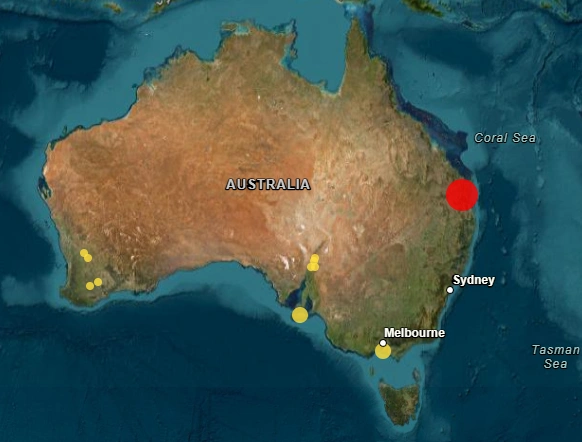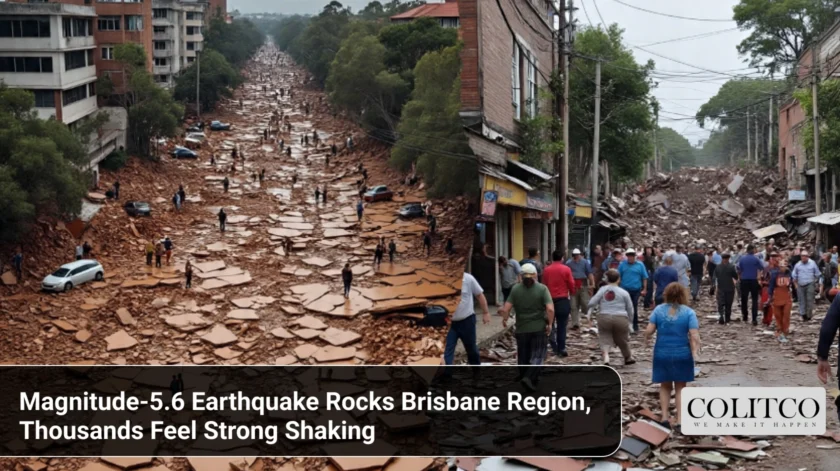Queensland residents woke to an unusual Saturday morning. A magnitude-5.6 earthquake struck southern Queensland, with residents reporting that their houses shook. The tremor marks one of the most significant seismic events in the region in years.
Geoscience Australia said there had been more than 10,000 “felt reports” within hours of the earthquake, demonstrating the widespread impact across the state.
Earthquake Details and Location
The Australian Government’s national geoscience organisation, Geosciences Australia, reported the earthquake striking at around 9:49am on Saturday morning. It reported the epicentre to be near Kilkivan, about 220 kilometres north-west of Brisbane, while the depth of the quake reached about 10 kilometres.
We’ve detected an #earthquake with a preliminary magnitude of 5.6 at 9:49 AM in Kilkivan, Queensland. If you need assistance, contact your local emergency services. Complete a felt report at https://t.co/EnrrkLveAw. pic.twitter.com/i6KFTGBpEA
— Geoscience Australia (@GeoscienceAus) August 16, 2025
The shallow depth contributed to the earthquake’s intensity across the region. The shallow depth of the quake caused it to be felt more strongly near the epicenter than a deeper quake of similar magnitude would Geoscience Australia reported the quake occurred at a depth of 10 kilometres at longitude 152.27 and latitude -26.24. This is in an area east of Murgon and south-east of Goomeri.
Widespread Impact Across Southeast Queensland
The earthquake’s effects stretched far beyond its epicentre. Residents as far south as the Gold Coast and as far north as Hervey Bay reported feeling the tremor. Social media quickly filled with accounts from startled residents across the region.
Brisbane residents felt the shaking strongly, with many taking to social platforms to confirm their experiences. Some were quick to joke on social media, while others reported feeling their houses shake. One Gold Coast resident quipped about the earthquake’s potential impact on property prices.
Early damage reports began emerging from communities near the epicentre. A Yarraman resident, Tom Brierley, said after he felt the earthquake, he went outside his house to see what was happening. He found “a big gap” had opened up between his front wall and roof
The earthquake coincided with power disruptions. A widespread power outage, affecting more than 6500 Ergon Energy, customers coincided with the earthquake.
Official Response and Monitoring
Geoscience Australia, the national earthquake monitoring agency, quickly assessed the situation. There is no tsunami risk, authorities confirmed, providing reassurance to coastal communities.
The rapid accumulation of felt reports demonstrated the earthquake’s significant impact. By 10:00am, more than 180 reports of shaking had been received by Geoscience Australia. By 10:15am, this had risen to more than 6500 reports.
Different international agencies recorded varying magnitudes. The U.S. Geological Survey (USGS) put the magnitude substantially lower, at 4.9, while Geoscience Australia maintained the 5.6 reading.
Historical Context of Australian Earthquakes
Australia experiences regular seismic activity despite its position away from major tectonic plate boundaries. Based on data from the past 25 years and our earthquake archive back to 1900, there are about 785 quakes on average per year in Australia.
This latest earthquake adds to Queensland’s recent seismic history. The state has experienced several notable earthquakes in recent years, including events that have affected mining operations and urban centres.
Recent months have seen increased earthquake activity across Australia. The Hunter Valley experienced a significant 4.6 magnitude earthquake earlier this year, while Sydney residents were woken by tremors from a Muswellbrook earthquake in 2024.
Australia’s Seismic Landscape
Earthquakes above magnitude five occur every one-to-two years, with an average of 100 quakes at magnitude three or lower recorded each year in Australia, according to the agency. This places Saturday’s 5.6 magnitude event as a significant occurrence for the region.

Queensland sits within Australia’s broader seismic framework, where geological stresses periodically release through earthquake activity. While major destructive earthquakes remain rare, the state’s growing population centres face increasing exposure to seismic risks.
Recent earthquake activity has also affected international neighbours. Earlier this year, Fiji experienced a 6.5 magnitude earthquake and Tonga was struck by a magnitude-7 earthquake that triggered tsunami warnings.
Also Read: Bunnings Launches $1 Mini Version of Its Iconic Bucket
Safety and Preparedness
Saturday’s earthquake serves as a reminder of the importance of earthquake preparedness. Residents should understand basic safety protocols during seismic events, including the “Drop, Cover, and Hold On” technique.
Emergency services reported no major injuries or significant structural damage from Saturday’s earthquake. However, the event highlighted the need for continued monitoring and community awareness about earthquake risks.












